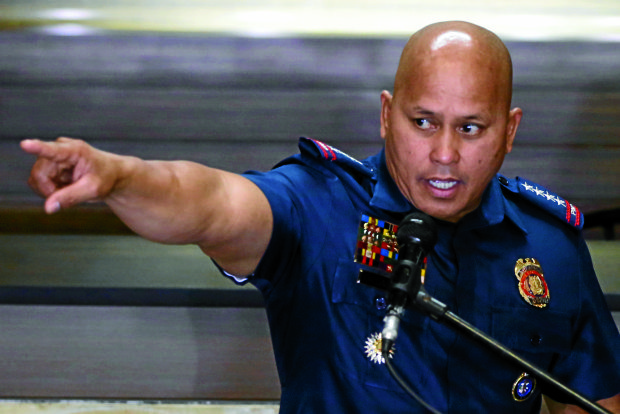Bato probes ‘Korean mafia’ hand in kidnap-slay

Philippine National Police Director General Ronald “Bato” Dela Rosa. INQUIRER FILE PHOTO / NINO JESUS ORBETA
A syndicate of rogue policemen extorting money from foreign businessmen working in Central Luzon is behind the kidnapping for ransom and murder of South Korean businessman Jee Ick-joo last October, the Philippine National Police chief said on Friday.
Police Director General Ronald “Bato” dela Rosa told reporters that a “Korean mafia” preying on rich Koreans in the Philippines may also have been involved in Jee’s case, but said it was up to PNP and National Bureau of Investigation probers to look into reports about the group.
“There are competing [Korean crime groups] within that community but we have not yet established [their involvement]. It’s possible there is. That theory is being pursued by the PNP and the NBI in their investigation,” Dela Rosa said.
Asked how long the Korean gangs had been operating, Dela Rosa replied: “I just heard about them. I’m not yet that much privy to that mafia [investigation].”
Corrupt NBI officials
Article continues after this advertisementThe PNP chief claimed that corrupt NBI officials, conspiring with policemen like SPO3 Ricky Sta. Isabel, a major suspect in Jee’s murder, are accepting payoffs from Korean businessmen, including operators of online gaming.
Article continues after this advertisement“The online gaming [operators] regularly give to the corrupt NBI officials but Jee was a good man. He didn’t want to give, so to teach other Koreans involved in online gambling a lesson and to scare them, they used Sta. Isabel to make it appear [that Jee’s abduction] was a drug operation,” Dela Rosa said.
He said members of the rogue cops’ syndicate probably regretted the premature killing of Jee and just tricked the Korean’s wife into believing he had been kidnapped by demanding a P5-million ransom.
‘Really a syndicate’
“They are really into this job. They’re really a syndicate. Members of two agencies conniving, those who were up to no good,” Dela Rosa said.
He said Sta. Isabel’s alibi that he was on a firing range at the time of the murder may have been preparation for the planting of evidence.
“The gun [that] he was planning to plant on Jee in case their plan for a buy-bust operation [to frame Jee] in Quezon City Circle materialized. The fired gun and the [spent casings], he [would] use them,” Dela Rosa said.
Witnesses have tagged Sta. Isabel as the one who led the abduction of Jee from his home in Angeles City, Pampanga province, on Oct. 18 last year.
Other witnesses have said Jee was killed on the same day and his body was taken to a funeral home in Caloocan City then to an undertaker in La Loma, Quezon City, for cremation.
‘I’m not scared’
On the claim of another suspect, Sta. Isabel’s team leader, Supt. Rafael Dumlao III, that influential people were protecting Sta. Isabel and were the real masterminds of the crime, Dela Rosa said: “Maybe those he implicated were big officials from the NBI. Maybe he’s afraid of them. He may be scared, but I’m not.”
On Dumlao’s claim that the syndicate and Sta. Isabel’s protectors were “many” and “difficult to clash with,” the PNP chief said: “Bring it on. In the interest of justice, I’m willing to die any time. I’m just doing my job in the interest of justice.”
In a television interview on Friday morning, the PNP Anti-Kidnapping Group chief, Senior Supt. Glenn Dumlao, said investigators were exploring the background of Jee and his manpower deployment business and they were aware of other possible motives for the murder.
Dumlao said the investigators had established that Jee was not involved in drugs and that he was a “respected businessman.”
Main player
He said he and other investigators believed Sta. Isabel planned and executed the operation against Jee, from the fake drug raid to the businessman’s murder.
“We have linked the events. This Sta. Isabel seems to be the main player. He had been doing it for a long time and he had accomplices outside. He just used other police units in his mischief,” Dumlao said.
The murder of Jee has led to the suspension of all police antinarcotics operations to give way to a cleansing of the ranks.
Dela Rosa said he would assign 100 Special Action Force officers to help the Counter-Intelligence Task Force in removing criminals from the police ranks.